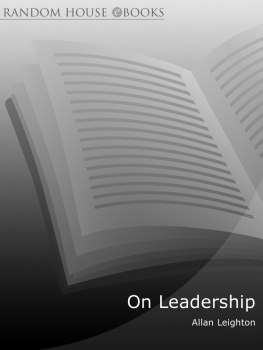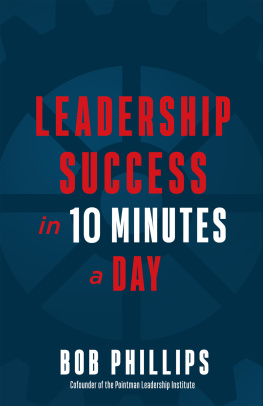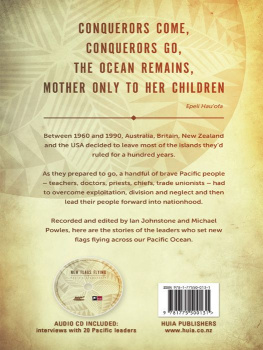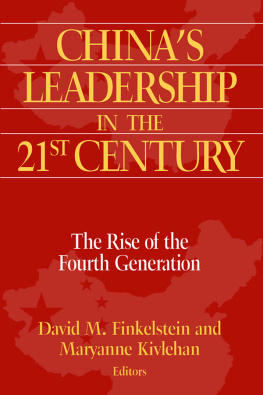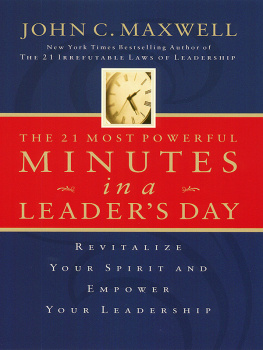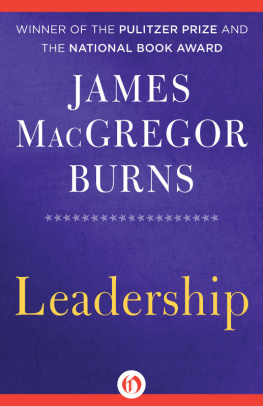
About the Book
Allan Leighton is one of Britains top businessmen, and here in his characteristically forthright and straight-talking way he takes the lid off the art of leadership. Is it a skill youre born with? Is it something you have to spend years studying? Or is it simply a matter of common sense and a willingness to learn? Drawing on his own experiences at companies as varied as ASDA, BSkyB and the Royal Mail, and on interviews with everyone from Philip Green and Rupert Murdoch to James Dyson and Martha Lane Fox, he gives a compelling and highly entertaining 360-degree view of what it takes to be a leader in todays cut-throat global economy.
On Leadership
Practical Wisdom from the People Who Know
ALLAN LEIGHTON
with Teena Lyons

This ebook is copyright material and must not be copied, reproduced, transferred, distributed, leased, licensed or publicly performed or used in any way except as specifically permitted in writing by the publishers, as allowed under the terms and conditions under which it was purchased or as strictly permitted by applicable copyright law. Any unauthorised distribution or use of this text may be a direct infringement of the authors and publishers rights and those responsible may be liable in law accordingly.
Version 1.0
Epub ISBN 9781407008295
www.randomhouse.co.uk
Published by Random House Business Books 2008
2 4 6 8 10 9 7 5 3 1
Copyright Allan Leighton 2007
Allan Leighton has asserted his right under the Copyright, Designs and Patents Act 1988 to be identified as the author of this work
This book is sold subject to the condition that it shall not, by way of trade or otherwise, be lent, resold, hired out, or otherwise circulated without the publishers prior consent in any form of binding or cover other than that in which it is published and without a similar condition, including this condition, being imposed on the subsequent purchaser
First published in Great Britain in 2007 by
Random House Business Books
Random House, 20 Vauxhall Bridge Road,
London SW1V 2SA
www.rbooks.co.uk
Addresses for companies within The Random House Group Limited can be found at: www.randomhouse.co.uk/offices.htm
The Random House Group Limited Reg. No. 954009
A CIP catalogue record for this book is available from the British Library
ISBN 9781905211449
Contents
The entrepreneurial touch
The challenges of the day to day
Why standing still is never an option
The art of keeping your eye on the ball
Why listening with is more important than talking at
Why no one succeeds on their own
Understanding the first rule of business
How to get your message across
How to keep both sides happy
Never the twain shall meet?
How to create enduring success
Doing the right thing
Whos who
To Annie, Rebecca, Jay,
Rob, Bertie and Rosie
About the Author
Allan Leighton began his career at Mars Confectionery where he rose to become group marketing director before leaving to join the loss-making ASDA supermarket chain. There he was credited with turning what he once described as a basket case into a highly successful company that was sold to US retail giant Wal-Mart for 6.7 billion in 1999. When he left his position as president and chief executive of Wal-Mart Europe he famously coined the phrase going plural as he took on non-executive positions at a string of companies, including lastminute.com, Leeds United, Bhs, BSkyB and Selfridges.
Allan is currently Chairman of Royal Mail Group and Race for Opportunity and non-executive director of BSkyB and George Weston, as well as deputy chairman of Selfridges & Co.
Teena Lyons has spent most of her career as a financial and consumer affairs journalist. She spent seven years as retail correspondent at the Mail on Sunday, breaking a number of high-profile news stories and regularly interviewing the most important business leaders in the sector. She has also written for a number of other national newspapers including the Daily Telegraph, Daily Mail and Sunday Mirror. Teena is a regular contributor to a range of consumer and trade press magazine titles, including Cosmopolitan, Woman and the Grocer.
Acknowledgements
Id like to thank ex-Mail on Sunday business journalist Teena Lyons for the sterling support she gave me in helping write this book. Also Christine, my personal secretary for over fifteen years, who had the unenviable challenge of arranging interviews with the sixty busy men and women who shared their thoughts on leadership. Quite an achievement!
At Random House, Gail Rebuck for spurring me into capturing my thoughts in the first place and Nigel Wilcockson who has worked so hard in overseeing the project.
My appreciation of course to all those who kindly gave their time to share their valuable insight into what it takes to be a great leader.
Finally Id like to thank all the people Ive worked with over the years whether it be a checkout operator, postman or -woman, chairman or chief executive all of whom have taught me so much about life, business and myself.
All my royalties from this book will be donated to Breast Cancer Care.
Allan Leighton
June 2007
Introduction
Among the many things that have happened to me in my thirty or so years in business, two events stand out particularly clearly in my mind. The most recent occurred in April 2002, when I became chairman of the Royal Mail. In taking on the role, I was, of course, only too acutely aware of the mess that the Royal Mail had got itself into it was haemorrhaging money at a rate of knots. I also knew that, almost before I did anything else, I needed to do something about its name. Back in March 2001 the Post Office holding company had changed the organisations name to Consignia in an ill-fated attempt to reflect the quickly changing nature of the business. Yet it was clear that at the core of the Royal Mail business was pride in its association with the Crown after all, this was a business that could trace its roots back to Charles I. Everyone I spoke to hated the new corporate name of Consignia, not least because it meant nothing at all. By contrast, staff and customers had really valued the fact that the Mail was Royal because there is hardly anything called Royal these days and few organisations that display the Queens crown. In marketing terms Royal is a hugely powerful image.
I got the message the Royal Mail was all about its heritage, which was Royal and British, a fact reflected in its uniform and red livery. The core idea was that it was much more than just a company. I knew it would also give me a quick win on taking the chair to reverse the unpopular change and ditch the Consignia name for good; and a quick win is very useful for any new boy. It would help to prove to critics, fed up with lacklustre service, that we really meant business.
When I summoned the advisers there was much shaking of heads. They told me point-blank that such a change would take at least six months. We needed permission for the change from the Queen and this was a lengthy process. But I wanted action now. Fortunately, Ive worked with Prince Charles a number of times on Princes Trust projects, and so I felt able to contact him and tell him what I wanted to do. He was hugely enthusiastic and added that he thought it would be particularly appropriate in the Golden Jubilee year. This meant that the change could be announced virtually overnight instead of having to wait up to a year for various advisers to follow things through. I think we were all glad to consign Consignia to the flames.
Next page
